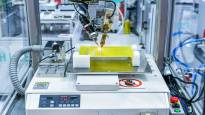DRESDEN The world’s most coveted product is now semiconductor chips.
They are tiny electronic parts, without which there would be, for example, modern refrigerators, mobile phones, airplanes or weapon systems.
The problem for the European industry is that by far the majority of the top quality microchips are made on the island of Taiwan in the armpit of China.
The supply problems during the corona pandemic revealed what kind of lifeline own microchip production is for European industry, for example German car factories.
Read here why microchips have become the target of brutal competition between the major powers. Finland is also aiming for its own production.
Now the East German city of Dresden plans to become a center for microchips and artificial intelligence. Study places at the local microchip institute, i.e. Dresden Chip Academy, have been clearly increased just this fall.
Dresden has been a pioneer in the field, because even before German reunification there was a large electronics industry in East Germany.
– Next, we will build a brand new training center in cooperation with microchip companies. We hope to get students from abroad as well, director of the educational institution Dagmar Bartels tells.
There are already five microchip factories in Dresden and the construction of a sixth will soon begin. The Taiwanese giant TSMC will build a new factory worth billions of euros and thousands of workers next to the airport in a couple of years.
The labor shortage in the sector is huge. Microchip factories need many kinds of experts, from apprentices to microtechnicians, chemists and army officers.
And Dresden is not the only city in the microchip business. Factories have sprung up in several locations in Germany, from Itzehoe in the north to Munich in the south. Starting in the fall, semiconductor experts will be trained in several new courses and degrees around the country.
For example, the US company Intel is building a 30 billion euro factory in Magdeburg. One hundred students will start a new artificial intelligence engineering university degree there this fall. Intel sponsors the students’ training equipment.
The American company is also preparing cooperation with the German army. It plans to offer ex-soldiers new career opportunities from the beginning of next year. Soldiers have According to Intel both “soft and hard” skills suitable for semiconductor work.
Studying microtechnology Sophie Hentschel says that he chose the field because of his father’s example and the neatness of the work. The production of printed circuit boards is clinically clean, because the microchips do not tolerate any dust in the manufacturing process.
– Cleanliness is also very important to me in my free time, Hentschel says. A good income level and a secure job are also attractive in the field.
At a semiconductor factory, the main job of the employees is to control the equipment and repair it if necessary.
Workers are needed more than experts
Students at the Dresden Microchip Academy work and get paid during their studies. Many of them graduate directly to the service of your example Infineon or NXP semiconductor manufacturers.
More than engineers and designers, microchip factories need craftsmen. There is a big need, for example, for workers who maintain the pipe systems needed to move chemicals.
Such a mechatronics fitter will Frank from Motzny.
– I feel safe and confident because I know that I will be strong in the future. At least this profession is not dying, Motzny rejoices.
The growth of the extreme right is frightening
Getting foreign students to Dresden can be made difficult by the fact that, at the same time as new factories are being built, the extreme right has increased its popularity in East Germany. In Dresden, the AfD, or Alternative for Germany party, is already supported by almost every third voting age.
A welcoming atmosphere is important in attracting foreigners, but Dresden has more xenophobia than the rest of Germany.
– I have met foreigners who were afraid here, says the electrical engineering teacher Norbert Rüdiger.
There are already employees from dozens of different countries in the city. For example, there are a lot of Japanese people visiting Dresden on work gigs to install equipment.
– There are people my age here who have never had contact with foreigners.
– Where do you get foreigners from, that is the question. The area must be made attractive, and the city and the entire country must fight aggressively against xenophobia, says Rüdiger.
Students also understand the need for foreign labor. Lukas Müller is studying for the third year as a micro technician.
– Immigrants will come despite the increase in AfD’s popularity. Political decision-makers should increase people’s sense of security so that it is not so easy for populists to argue people to their side, Müller hopes.
In any case, thousands more experts in the field will be needed in the next few years.
You can discuss the topic on 13.9. from Wednesday evening until 11 pm.
